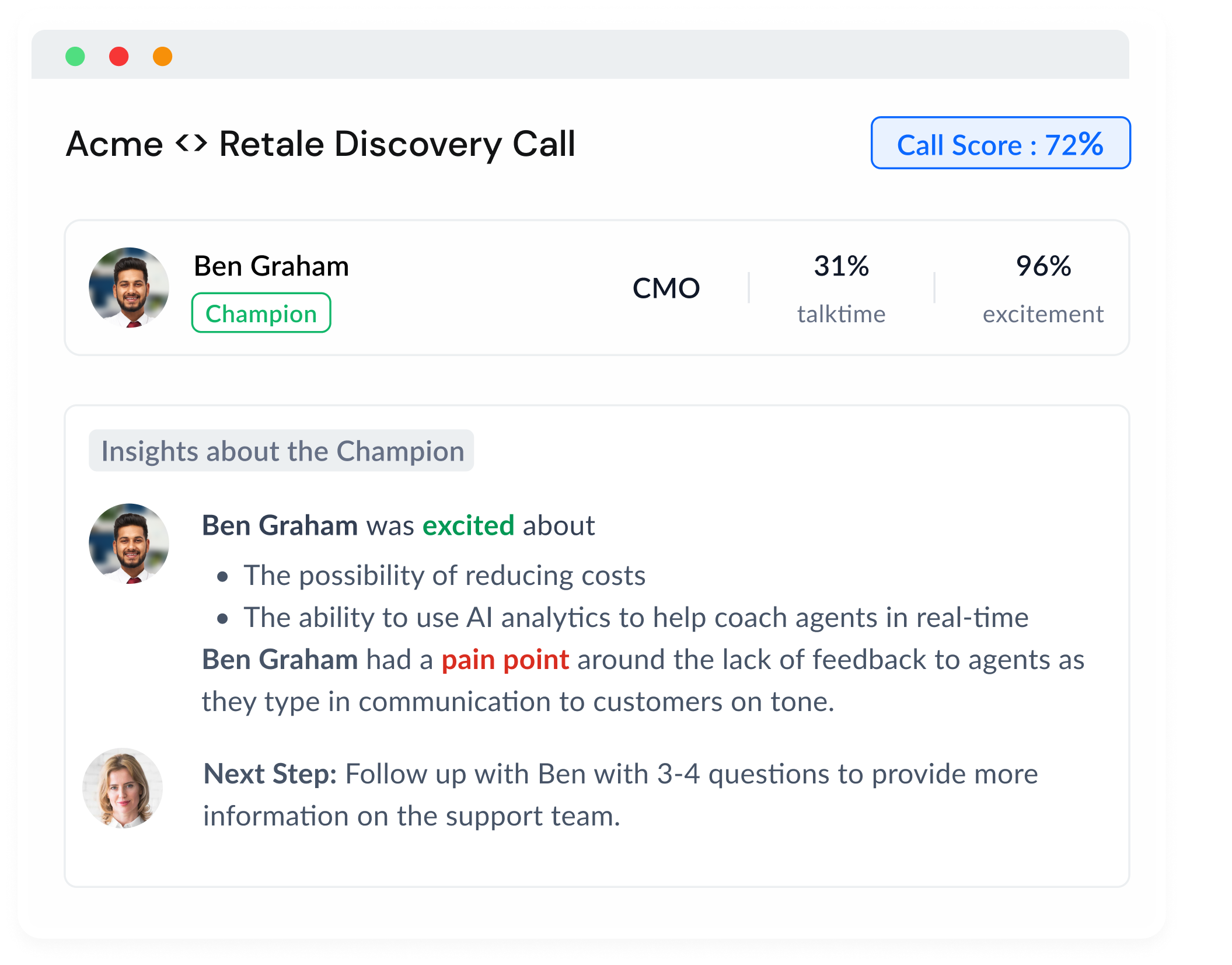Over the last 3 years, conversational intelligence went from being a nice-to-have to a must-have for inside sales teams, and completely changed the game for call review, coaching, and sharing the voice of the customer across the organization. Gong and Chorus became household names by virtue of being early and solving the need for call recording and transcription well.
As we head into a new age fueled by tools like ChatGPT and Midjourney that make all previous AI tools seem lame, the conversational intelligence market is in flux. Many new players are emerging that are AI-first and automate big parts of a seller’s workflow, while old players are scrambling to power their stack with generative AI in a way that it serves their customers and prospect expectations.
In this post, I dive deep into the fundamentals of conversational intelligence for sales, the key benefits that sales teams using CI accrue over time, and the popular tools in the category. I would then head into how the landscape of CI is changing with generative AI, and the new trends that we are seeing emerge across the spectrum of CI tools, with a hint of what the future might look like.
Read on to learn more about conversational intelligence, learn how to make a good judgment of what tool might be best suited for your organization, and how to stay ahead of the curve as the market expectations and capabilities are changing rapidly.
What is Conversational Intelligence & How It Works
Conversational intelligence is the process of analyzing and understanding communication within sales calls to extract key insights, trends, and opportunities (much like how Michael Scott from The Office would boast about his uncanny ability to "read" people).
By using advanced technologies like artificial intelligence (AI) and natural language processing (NLP), conversational intelligence tools transcribe, process, and analyze sales conversations, giving you the power to understand your prospects.
So, instead of winging it in sales calls and coaching based on heuristics and reported behaviors, conversational intelligence tools can help you identify patterns and valuable information, enabling you to refine your sales strategies and achieve better results.
Of course, conversational intelligence is not a silver bullet to B2B sales personalization and we’ll get to why in just a bit. But it’s a great start to going from memory and intuition-based selling to data-driven selling.
Conversational Intelligence: Top 5 Benefits for Sales Professionals
Since 2015, when conversational intelligence was new and tools like Gong and Chorus were just emerging, this sales superpower has transformed into so much more than a buzzword, but a game-changer for sales professionals.
Let's dive into the top 5 benefits of using a CI solution in today’s market:
Conversational Intelligence Benefit #1: Improved Sales Performance
With conversational intelligence, you can identify the most successful sales tactics and replicate them across your team. This leads to a more consistent and effective sales process, ultimately boosting your team's performance.
How? Call recording help you replay calls from deals won, and those from deals lost, and identify the words, tonality, questions, and answers that best move prospects down the funnel. This helps you coach your team on what’s working in the market, considerably speeding up learning and boosting performance across the board. This speeds up the process of converting the average rep into a close replica of the top-performing rep, which is what you need!
Conversational Intelligence Benefit #2: Enhanced Coaching and Training
By analyzing sales calls, conversational intelligence provides actionable insights into each rep's strengths and weaknesses based on the things they are actually saying and doing on calls.
This data-driven approach allows sales leaders to tailor coaching and training programs, transforming their teams into a well-oiled selling machine. This helps improve ramp times, as new reps can listen to the best conversation snippets from closed/won deals and learn much quicker even before starting to take calls themselves.
Conversational Intelligence Benefit #3: Faster Deal Cycles
Conversational intelligence helps sales reps uncover pain points and objections for similar buyer personas, enabling them to address them proactively.
This leads to faster deal cycles and higher closing rates, as prospects are guided through the sales process more efficiently.
Conversational Intelligence Benefit #4: Better Collaboration
By sharing insights and best practices across the team, conversational intelligence fosters a collaborative environment where everyone learns from each other's successes and failures. Product marketers, marketing heads, customer success, product leaders, and company leadership - all have access to the voice of the customer and can take decisions by prioritizing the customer’s actual needs rather than their own intuition.
As any sales community out there would tell you, there's a lot to learn from each other's experiences.
Conversational Intelligence Benefit #5: Time-saving Automation
Transcribing and analyzing calls can be a time-consuming process.
Conversational intelligence tools automate these tasks, allowing sales professionals to focus on more important aspects of their job. Like actual selling.
And in a bear market, where every deal takes more time, more effort and more calls, this simple automation can differentiate the winners from the losers.
How Sales Professionals Are Using Conversational Intelligence: The Top Use Cases
Conversational Intelligence Sales Use Case #1: Personalizing Sales Pitches
Picture this - you are armed with conversational intelligence that would allow you to know and remember each prospect's needs and preferences, creating a truly personalized sales pitch.
By transcribing customer interactions, conversational intelligence helps sales professionals transform their pitches into finely-tuned masterpieces that resonate with each prospect.
Conversational Intelligence Sales Use Case #2:Identifying Upsell Opportunities:
Remember when Dwight Schrute in The Office managed to sell a massive paper order by tapping into a client's unspoken needs?
Conversational intelligence is like having a Dwight on your team, uncovering hidden upsell opportunities by tracking customer conversations. This enables sales professionals to seize the moment and maximize revenue, just like the Assistant (to the) Regional Manager we all know and love.
Conversational Intelligence Sales Use Case #3: Monitoring Team Performance:
Imagine having a bird's-eye view of the Dunder Mifflin sales team's performance, much like Michael Scott in his office, but with actual insights.
Conversational intelligence helps sales leaders monitor individual and team performance based on their actual sales conversations. This helps them identify areas for improvement, and provide targeted coaching and feedback.
It's like giving Jim Halpert the opportunity to apply his prankster creativity to close more deals or helping Stanley Hudson find motivation beyond Pretzel Day.
With conversational intelligence, your sales team can reach new heights, turning even the most mundane workdays into success stories.
How to Choose a Conversational Intelligence Software for Sales Teams: Top 5 Features to Look For
Selecting the right conversational intelligence software for your sales team is like choosing the perfect toppings for a pizza party at Dunder Mifflin. It can make or break the entire experience.
To help you make an informed decision, here are the top 5 features to look for:
- Accurate Transcription and Analysis
Nothing can replace the importance of accuracy when it comes to transcribing and analyzing sales calls. The best conversational intelligence tools should provide at least 90% transcription accuracy, ensuring you don't miss crucial details. As the famous Michael Scott quote goes, "You miss 100% of the shots you don't take," and accuracy in your software ensures you're taking the right shots.
- Seamless CRM Integration
Nearly every sales pro we speak to knows that having a 360-degree view of each customer is important. But the most-hated part of their jobs? You guessed it - updating CRM!
A conversational intelligence tool that seamlessly integrates with your CRM is essential. All so your sales team can get the 360-degree view they need without wasting time on busy work.
- Customizable Insights
Like how Kevin Malone loves his chili, your sales team has its unique preferences when it comes to insights.
Look for a tool that offers customizable insights, allowing your team to focus on the metrics that matter most to them.
Customizable insights help sales reps refine their strategies and deliver better results.
- Scalability and Flexibility
A growing sales team needs a conversational intelligence tool that can grow with them.
A software that is easily scalable and flexible will help your team adapt as your business evolves.
Choose a tool that can handle an increasing volume of calls and adapt to the changing needs of your organization.
- Robust Security and Compliance
Make sure your chosen conversational intelligence software meets stringent security and compliance requirements to protect your organization's valuable data. More importantly, your customers’ data and interests.
But is that all? Far from it. Most of the conversational intelligence tools out there might have these features but they leave the intelligence at what’s said. How do you account for what your customers are not saying?
What's Missing in Top Conversational Intelligence Tools for Sales
People buy from people, not from a CRM tool and not surely not from a sales call recording tool. Which makes empathy and emotional intelligence a whole lot more important. And yet, most conversational intelligence tools don’t help sales pros read the room at all. All they do is transcribe calls. That’s intelligence, sure. But is it true, holistic intelligence on where your deals are headed or how your sales reps are performing? Far from it.
Studies have shown that nonverbal communication accounts for up to 93% of the overall message in face-to-face interactions. With their inherent human intelligence, high EQ sales pros have been real pros at reading these nonverbal cues in F2F meetings.
Understanding the importance of emotional intelligence and nonverbal cues in sales can make a significant difference in your sales success.
Here's an example: imagine a sales call where the prospect is frequently looking away, fidgeting, or displaying closed body language. These nonverbal cues can indicate disinterest or discomfort or an unspoken objection, which a sales professional with high EQ can pick up on and address accordingly.
But in the post-COVID world, this power has been taken away from even the most empathetic sales pros out there.
Nonverbal cues can provide valuable insights into a prospect's thoughts, feelings, and intentions, ultimately helping sales professionals build stronger connections and close deals more effectively. But doing this on virtual calls is not as easy as it used to be when you sat across the table from your prospect.
Bain & Company finds that 92% of business-to-business (B2B) buyers favor virtual sales calls in the post-COVID world. Sales pros like them too, since virtual calls give them time to meet more prospects. But they all agree that “reading the room on Zoom” is tough.
And yet, most conversational intelligence tools do not account for these crucial nonverbal cues on virtual sales calls, leaving a gap in the overall understanding of the sales conversation, buyers’ needs, pain points and objection, and rep performance. This is where Sybill comes in.
Conversational Intelligence + Emotional Intelligence and the Whole New World of Virtual Sales
Sybill bridges the gap between hearing and truly listening by adding the magic of behavioral AI to conversational intelligence for sales.
By incorporating emotional intelligence and nonverbal cues into sales call analyses, Sybill helps sales professionals gain a deeper, more holistic understanding of their prospects and their needs.
More importantly, EQ saves sales pros from happy ear syndrome, all because the prospect said all the right things on the call (and left a lot unsaid).
In a bear market and even otherwise, having the edge that comes with emotional intelligence and a focus on nonverbal cues can make all the difference.
It's time to level up your sales, sales calls, sales follow ups, and sales coaching games with Sybill to unlock the true potential of conversational intelligence. That’s why more and more closers are moving from run-of-the-mill conversational intelligence for sales tools to the Sybill universe.















.png)





